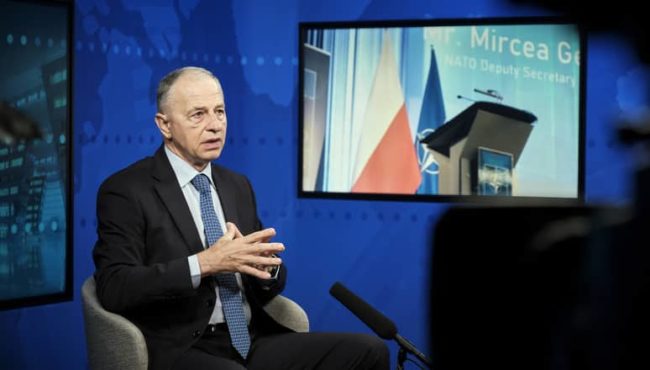Deputy Secretary General addresses NATO Resilience Symposium 2022

Opening remarks by NATO Deputy Secretary General Mircea Geoană at the NATO Resilience Symposium 2022. Co-organised between Poland, NATO Headquarters and Supreme Allied Command Transformation, the Symposium is taking place in Warsaw, and brings together Allied and Partner civilian and military leaders, policy makers and experts to address key issues on the resilience agenda.
On Thursday (5 May 2022), Deputy Secretary General Mircea Geoană virtually addressed participants at the NATO Resilience Symposium 2022, co-organised in Warsaw by the Government of Poland, NATO Headquarters, and Allied Command Transformation. Pointing to Russia’s war in Ukraine, the COVID-19 pandemic, and growing geopolitical competition, the Deputy Secretary General underlined “the need to prepare, empower, and invest in our nations and our societies’ ability to defend themselves”.
Mr Geoană noted that NATO’s work on resilience is not new, but is grounded in Article 3 of the Alliance’s founding treaty, which commits Allies to maintaining and developing their individual and collective capacity to resist armed attack. Reflecting on the progress achieved since Allies agreed at the 2016 Warsaw Summit to enhance their resilience, he welcomed that the NATO 2030 agenda includes important deliverables on resilience. These include national goals and implementation plans, the designation of senior officials to coordinate national efforts, and the creation of a Resilience Committee at NATO Headquarters to take work forward.
The Deputy Secretary General further stressed that resilience is a “team sport”, requiring civil preparedness and military capacity, but also the participation of governments, the private sector, empowered citizens, and close cooperation with partner countries and organisations like the European Union. He added that Allies have agreed to provide tailored assistance to strengthen the resilience of Ukraine, as well as other partners at risk from Russian aggression, including Georgia.
The Deputy Secretary General’s speech opened the two-day NATO Resilience Symposium 2022, attended by civil and military representatives from NATO, NATO Allies and partners, the academic community, and the private sector. The symposium is aimed at building civil-military cooperation and relationships across sectors, in order to meet the challenges of an increasingly unpredictable security environment.
















